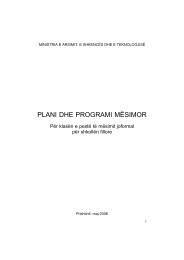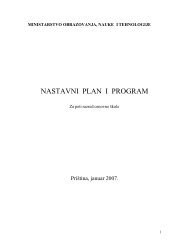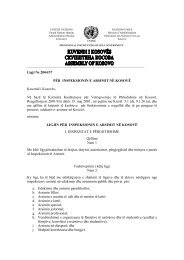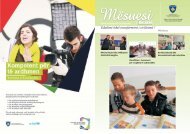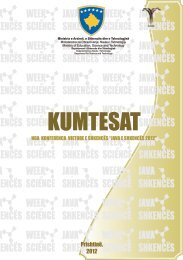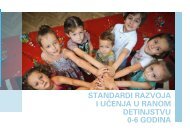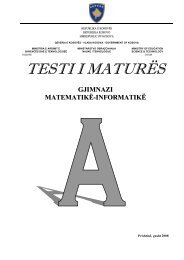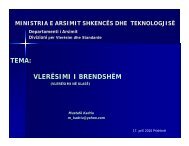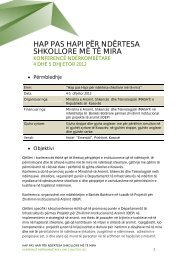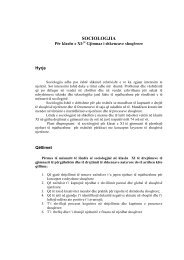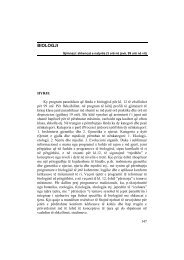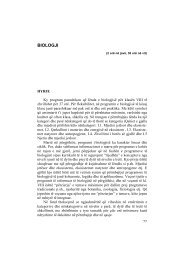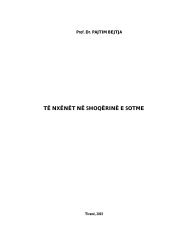Humboldt Kosmos 90/2007: Wissen schafft Entwicklung
Humboldt Kosmos 90/2007: Wissen schafft Entwicklung
Humboldt Kosmos 90/2007: Wissen schafft Entwicklung
Sie wollen auch ein ePaper? Erhöhen Sie die Reichweite Ihrer Titel.
YUMPU macht aus Druck-PDFs automatisch weboptimierte ePaper, die Google liebt.
<strong>Wissen</strong> <strong>schafft</strong> <strong>Entwicklung</strong> | || From Knowledge to Development <strong>Wissen</strong> <strong>schafft</strong> <strong>Entwicklung</strong> | || From Knowledge to Development<br />
Von Heidemarie Wieczorek-Zeul<br />
WissEnschaFtskoopERationEn als MotoREn FüR EntWicklunG<br />
acaDEMic coopERation as an EnGinE FoR DEvElopMEnt<br />
Dass wissenschaftliche <strong>Entwicklung</strong> keine Einbahnstraße<br />
sein muss, beweist das Georg Forster-Forschungsstipendienprogramm.<br />
Die Bundesministerin für wirtschaftliche<br />
Zusammenarbeit und <strong>Entwicklung</strong> zieht Bilanz.<br />
Seit rund zehn Jahren vergibt die Alexander von <strong>Humboldt</strong>-<br />
Stiftung Georg Forster-Forschungsstipendien an exzellente<br />
<strong>Wissen</strong> schaftlerinnen und <strong>Wissen</strong>schaftler aus <strong>Entwicklung</strong>s- und<br />
Schwel lenländern. Die Bilanz dieses Jubiläums ist ein Grund zum<br />
Feiern. 396 Stipendiatinnen und Stipendiaten aus 64 Ländern<br />
wurden seither gefördert und gehören nun zum weltweiten Netzwerk<br />
der Stiftung. Die meisten von ihnen, etwa 95 Prozent, sind<br />
nach ihrem Forschungsaufenthalt in Deutschland in ihre Heimat<br />
zurückgekehrt und wirken dort heute als Motoren für eine nachhaltige<br />
<strong>Entwicklung</strong>. Sie halten zugleich enge Kontakte zu ihren<br />
wissenschaftlichen Partnern in Deutschland. So wird wissenschaftliche<br />
<strong>Entwicklung</strong> zur „Zweibahnstraße“, von der beide Seiten<br />
profitieren. Wie alle von der <strong>Humboldt</strong>-Stiftung geförderten<br />
<strong>Wissen</strong>schaftler sind auch Georg Forster-Stipendiaten gefragte<br />
Fachleute, die in ihrer Disziplin zur Spitze gehören und von deren<br />
<strong>Wissen</strong> und Methoden nicht nur die Herkunftsländer profitieren,<br />
sondern auch Deutschland.<br />
„Exzellente <strong>Wissen</strong>schaftler sind das unverzichtbare<br />
Kapital im weltweiten Wettbewerb der <strong>Wissen</strong>schaftsgesellschaften,<br />
an dem <strong>Entwicklung</strong>sländer genauso<br />
teilnehmen und teilnehmen müssen, wie Deutschland<br />
dies tut.“<br />
Die <strong>Wissen</strong>schaftszusammenarbeit und die tertiäre Bildung bilden<br />
eine wichtige Säule in unserer <strong>Entwicklung</strong>szusammenarbeit.<br />
Eine gut ausgebildete Bevölkerung und die Fähigkeit einer<br />
Gesellschaft, neues <strong>Wissen</strong> aufzunehmen, umzusetzen und weiterzuentwickeln,<br />
sind für den <strong>Entwicklung</strong>sprozess entscheidend.<br />
<strong>Wissen</strong>schaft und tertiäre Bildung stellen die Grundlage für eine<br />
wirtschaftliche Dynamik dar, ohne die soziale Verbesserungen<br />
und Armutsminderung nicht dauerhaft möglich sind. Innerhalb<br />
der <strong>Wissen</strong>schaftszusammenarbeit ist das Georg Forster-Stipendienprogramm<br />
ein wichtiges Instrument. So freut es mich sehr,<br />
dass das Bundesministerium für wirtschaftliche Zusammenarbeit<br />
und <strong>Entwicklung</strong> für dieses Stipendienprogramm seit 1998 etwa<br />
18 Millionen Euro zur Verfügung stellen konnte.<br />
By Heidemarie Wieczorek-Zeul<br />
scientific development does not have to be a one-way<br />
street, as the Georg Forster Research Fellowship programme<br />
shows. the Federal Minister for Economic cooperation and<br />
Development takes stock.<br />
For the last ten years, the Alexander von <strong>Humboldt</strong> Foundation<br />
has been granting Georg Forster Research Fellowships to excellent<br />
scientists and scholars from developing and threshold countries.<br />
On this anniversary, their record is cause for celebration.<br />
396 fellows from 64 countries have been sponsored so far and are<br />
now part of the Foundation’s worldwide network. Most of them,<br />
roughly 95 percent, returned home after their research stay in<br />
Germany and are engines for sustainable development in their<br />
countries today. At the same time, they keep in touch with their<br />
academic partners in Germany. This is the way in which scientific<br />
development becomes a “two-way street”, profiting both sides. Just<br />
as with all the other academics sponsored by the <strong>Humboldt</strong> Foundation,<br />
Georg Forster Fellows are also sought-after experts at the<br />
very forefront of their disciplines whose knowledge and methods<br />
not only benefit their own countries, but Germany, too.<br />
“In the worldwide contest between knowledge<br />
societies, in which developing countries are also taking<br />
part, indeed have to take part, just as Germany does,<br />
excellent academics are the essential assets.”<br />
Academic cooperation and tertiary education are an important<br />
pillar of our development cooperation. A well-trained population<br />
and a society’s ability to assimilate, utilise and advance new<br />
knowledge are decisive for the process of development. Science<br />
and tertiary education form the basis for the economic dynamism<br />
which is essential to sustain social improvement and the<br />
reduction of poverty. The Georg Forster Fellowship Programme<br />
is an important instrument for academic cooperation. I am thus<br />
delighted that the Federal Ministry for Economic Cooperation<br />
and Development has been able to provide approximately 18 million<br />
EUR for this fellowship programme since 1998.<br />
knowledge as the central resource<br />
The development focus of the research projects targets concrete<br />
progress in many fields: social, political, economic and technological.<br />
However, the value of such academic collaborations not only<br />
Afrikanische Georg Forster-<br />
Stipendiaten bei der Jahrestagung der<br />
<strong>Humboldt</strong>-Stiftung in Berlin | ||<br />
African Georg Forster Fellows at the<br />
Alexander von <strong>Humboldt</strong> Foundation‘s<br />
Annual Meeting in Berlin<br />
<strong>Wissen</strong> als zentrale Ressource<br />
Der entwicklungsrelevante Schwerpunkt der Forschungsprojekte<br />
zielt auf konkrete Fortschritte in vielen Feldern: gesellschaftlich,<br />
politisch, wirtschaftlich und technologisch. Doch der Wert dieser<br />
<strong>Wissen</strong>schaftskooperationen liegt nicht nur in den konkreten<br />
Projekten etwa von Biologen, Juristen, Agrarwissenschaftlern,<br />
Medizinern, Linguisten oder Ingenieurwissenschaftlern. <strong>Wissen</strong><br />
wird weltweit zur zentralen Ressource, und die Chancen und<br />
Erfordernisse sind überall die gleichen. Es geht um Innovationen,<br />
um angewandte Forschung und die Zusammenarbeit zwischen<br />
Wirtschaft und <strong>Wissen</strong>schaft, um die Schaffung von Hightech-<br />
Regionen sowie um Vernetzung und Kooperation im regionalen<br />
wie im globalen Maßstab. Exzellente <strong>Wissen</strong>schaftler und erstklassige<br />
Universitäten, die stark sind in der Forschung wie in der<br />
Lehre, sind das unverzichtbare Kapital im weltweiten Wettbewerb<br />
der <strong>Wissen</strong>schaftsgesellschaften, an dem <strong>Entwicklung</strong>sländer<br />
genauso teilnehmen und teilnehmen müssen, wie Deutschland<br />
dies tut. Das Georg Forster-Programm trägt dem Rechnung und<br />
stärkt <strong>Entwicklung</strong>sländer bei der Schaffung und beim Ausbau<br />
von Hochschul- und <strong>Wissen</strong>schaftssystemen, die zu Kristallisationszentren<br />
weiterer <strong>Entwicklung</strong> werden, etwa, indem sie Unternehmen<br />
anziehen und hoch qualifiziertes Personal ausbilden oder<br />
indem sie zu gefragten Partnern für internationale Kooperationen<br />
werden, die weitere <strong>Wissen</strong>s- und <strong>Entwicklung</strong>sgewinne bringen.<br />
Das Bundesministerium für wirtschaftliche Zusammenarbeit und<br />
<strong>Entwicklung</strong> unterstützt die Alexander von <strong>Humboldt</strong>-Stiftung<br />
und ihr Programm deshalb gerne und aus voller Überzeugung:<br />
Jedes Forschungsstipendium ist eine wichtige und sich vielfach<br />
lohnende Investition in eine nachhaltige Zukunft, zu der hoffentlich<br />
auch in den kommenden Jahren viele weitere Georg Forster-<br />
Stipendiatinnen und -Stipendiaten beitragen werden. n<br />
Heidemarie Wieczorek-Zeul, MdB, ist seit ok -<br />
to ber 1998 Bundesministerin für wirtschaftliche<br />
Zusammenarbeit und <strong>Entwicklung</strong>. ihr Einsatz<br />
gilt vor allem der Entschuldung der ärmsten<br />
hoch verschuldeten <strong>Entwicklung</strong>sländer, einer<br />
gerechten Welthandelsordnung, der steigerung<br />
der <strong>Entwicklung</strong>sausgaben und dem kampf<br />
gegen aiDs.<br />
lies in the concrete projects of biologists, lawyers, agronomists,<br />
physicians, linguists or engineers. Rather, knowledge is becoming<br />
the central resource worldwide, and the opportunities and<br />
requirements are the same everywhere. We are looking at innovations,<br />
applied research and cooperation between private enterprise<br />
and research, the creation of high-tech regions, as well as<br />
networking and cooperation on a regional and global scale. In the<br />
worldwide contest between knowledge societies, in which developing<br />
countries are also taking part, indeed have to take part, just<br />
as Germany does, excellent academics and first-class universities,<br />
strong on research and teaching, are the essential assets.<br />
The Georg Forster Programme recognises this fact and strengthens<br />
developing countries in the creation and development of university<br />
and science systems which become crystallisation centres<br />
for further development. This may take the form of attracting<br />
companies and training highly-qualified personnel or becoming<br />
sought-after partners for international collaborations which<br />
themselves lead to further gains in knowledge and development.<br />
This is the reason why the Federal Ministry for Economic Cooperation<br />
and Development is so willing to support the Alexander<br />
von <strong>Humboldt</strong> Foundation and why it does so with complete conviction:<br />
every research fellowship is an important and immensely<br />
worthwhile investment in a sustainable future to which I hope<br />
many more Georg Forster Fellows will continue to contribute in<br />
the coming years. n<br />
Heidemarie Wieczorek-Zeul, Member of the<br />
Federal parliament, has been Federal Minister<br />
for Economic cooperation and Development<br />
since october 1998. she is particularly committed<br />
to relieving debt in the poorest, high-debt<br />
developing countries, an equitable world trading<br />
system, increasing spending on development<br />
and the fight against aiDs.<br />
6 <strong>Humboldt</strong> kosmos Sonderausgabe 2008<br />
7



